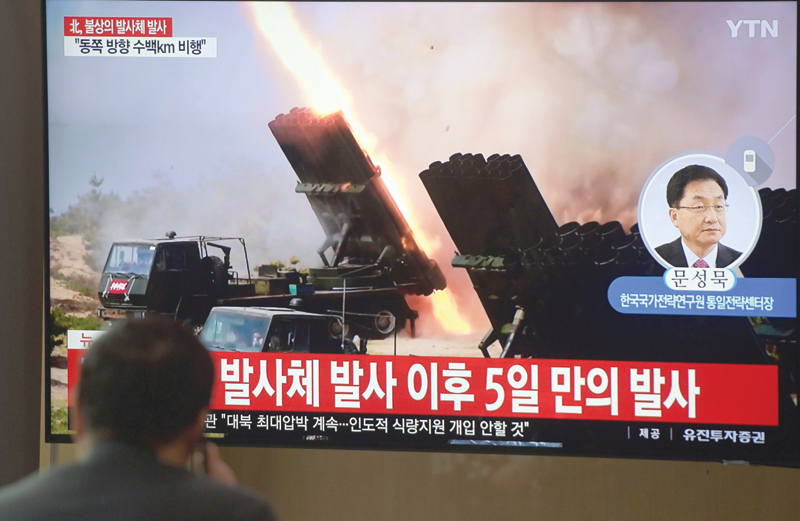

Seoul: North Korea welcomed a US envoy’s visit to Seoul by firing two missiles on Thursday, the South’s military said, in Pyongyang’s second launch in less than a week as it seeks to up the ante in deadlocked nuclear negotiations with Washington.
It came after North Korea carried out a military drill and fired multiple projectiles on Saturday, with at least one believed to be a short-range missile.
The North had not previously fired a missile since November 2017, shortly before a rapid diplomatic thaw eased high tensions on the peninsula and paved the way for a historic first meeting between its leader Kim
Jong Un and US President Donald Trump.
But their second summit in Vietnam in February broke up without an agreement rolling back Pyongyang’s nuclear programme in exchange for sanctions relief or even a joint statement, leaving the North frustrated by the stalemate.
Thursday’s launch came hours after the US Special Representative on North Korea, Stephen Biegun, arrived in Seoul late on Wednesday for talks with South Korean officials on the allies’ approach towards Pyongyang, in his first visit since the Hanoi summit.
The North “fired what appeared to be two short-range missiles”, Seoul’s Joint Chiefs of Staff (JCS) said in a statement, adding they flew eastwards for 270 and 420 kilometres and the South Korean and US militaries were jointly analysing them.
It was a “deeply worrying” development, said a spokeswoman for the South’s presidential office, “as it is not helping improvement of inter-Korean relations and efforts to ease military tensions”.
The JCS earlier said the launches appeared to originate from Sino-ri in North Pyongan province, 75 kilometres northwest of Pyongyang.
One of the North’s longest-running operational missile bases is in the area, which the Centre for Strategic & International Studies says houses a regiment-sized unit equipped with Nodong-1 medium-range ballistic missiles.
Biegun met his South Korean counterpart Lee Do-hoon for breakfast on Thursday and is due to hold discussions with the South’s foreign and unification ministers on Friday as the security allies — Washington stations 28,500 troops in the South to defend it from its neighbour — work on their approach towards Pyongyang.
With Thursday’s launch, said Hong Min, a senior researcher at the state-run Korea Institute for National Unification, “North Korea is sending a clear message that it will not be satisfied with humanitarian aid” being considered by Seoul.
“It is saying, ‘We want security guarantees in return for the denuclearisation process’,” he added.
“Kim could have felt he needed to show a strong military posture to ease complaints following a joint South-US military drill last month.”
Harry Kazianis of the Centre for the National Interest added that the North had “once again chosen a course of action today that can only worsen already growing tensions.
“Kim’s goal, beyond ensuring his weapons programmes are becoming more powerful, is quite clear: to show America and its allies that if they aren’t willing to compromise on the terms of denuclearisation that Pyongyang will indeed go its own way.”
Pyongyang, Seoul and Washington had all refrained from explicitly calling Saturday’s launch a missile — the South used the term “projectile” — which could jeopardise the ongoing diplomacy by violating UN Security Council resolutions as well as Kim’s announcement of an end to long-range missile tests.
But experts said at least one short-range missile was involved, with a report on the respected 38 North website suggesting that it was a “direct import” of a Russian-produced Iskander.
“The debris generated by the launch in North Korea is a virtual match of a launch of Iskander conducted by Russia,” it said.
If North Korea imported Iskanders from Russia, the report added, “it has an existing capacity to deliver warheads to targets in South Korea with great precision”.
Pyongyang insisted earlier on Thursday that Saturday’s “routine drill” was conducted within its own waters and added the “flying objects” did not pose any threat to the US, South Korea and Japan.
“The firing of the intermediate- and long-range missile and the ICBM was not involved in it,” a spokesman for the North’s delegation for military talks with the South said in a statement carried by the official Korean Central News Agency.
He condemned Seoul’s criticism of that launch, with KCNA’s headline reading: “S Korean military authorities urged to stop nonsense”.
Oman Observer is now on the WhatsApp channel. Click here



